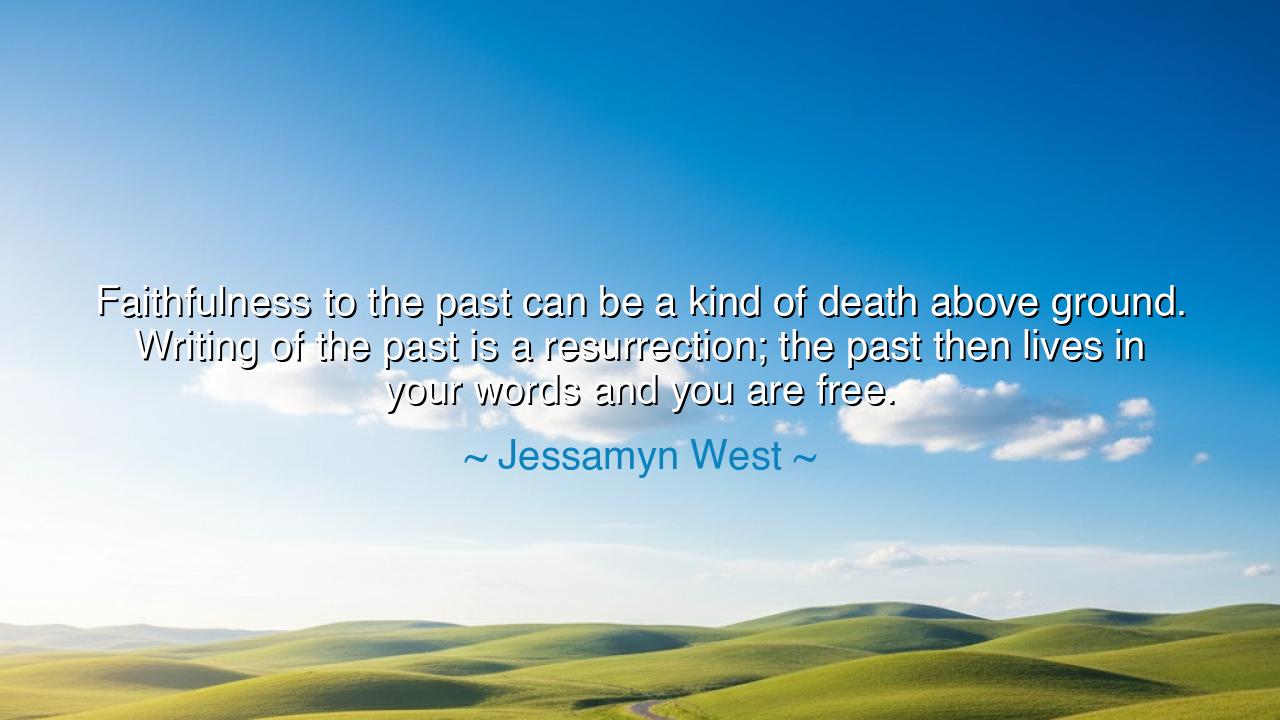
Faithfulness to the past can be a kind of death above ground.
Faithfulness to the past can be a kind of death above ground. Writing of the past is a resurrection; the past then lives in your words and you are free.






The words of Jessamyn West — “Faithfulness to the past can be a kind of death above ground. Writing of the past is a resurrection; the past then lives in your words and you are free.” — speak with the quiet thunder of revelation. They summon us to confront one of the deepest struggles of the human soul: how to live with memory. In these lines, West does not condemn remembrance — she sanctifies it, but only when it becomes creation, not captivity. To cling too tightly to the past is to live buried in it, entombed by nostalgia and regret. But to write, to give it form and language, is to transmute memory into art, pain into purpose, and history into life once more.
In saying that “faithfulness to the past can be a kind of death above ground,” West warns against the chains of remembrance that bind rather than bless. The one who worships the past without transforming it becomes like a ghost — moving through life, yet not living it. They honor what has been at the cost of what might be. But West, as a writer of memory and human emotion, shows a higher path: that by writing of the past, by shaping it through reflection and imagination, we awaken it anew. The act of creation breaks the tomb of memory; it brings the dead moments to light, not as they were, but as they live within us now.
In the ancient world, this belief was known to poets and philosophers alike. The Greeks told of Orpheus, who descended into the underworld to reclaim his lost love, Eurydice. His lyre, his song, was his power — and in his music, the dead stirred. So too, when we write or speak of what is gone, we become Orpheus ourselves, calling the shades of memory into the light. But unlike him, we do not lose them again — for once they are given form in words, they belong no longer to the grave but to eternity. To write the past is to resurrect it, not as a chain upon the living, but as a companion that walks beside us in freedom.
Consider the life of Anne Frank, a young girl who, though trapped in a hiding place during the darkness of war, gave her soul immortality through her diary. Her words transformed confinement into expression, fear into beauty. She could not change her fate, but through writing, she made her suffering speak, and her past became a living thing that continues to breathe in the hearts of millions. This is what Jessamyn West means by resurrection — that through the act of giving voice, the past ceases to rot in silence and instead becomes light that guides others.
But West’s insight goes deeper still. When she says, “The past then lives in your words and you are free,” she reveals a paradox of liberation. The past does not vanish when written — it lives — yet its power to enslave diminishes. By turning memory into meaning, the writer reclaims mastery over what once wounded or defined them. This act is not confined to artists; it is the work of every soul that chooses to confront its history honestly. To speak, to write, to confess — these are all forms of resurrection. Through them, we do not forget, but we rise above forgetting.
Thus, her words are not merely about art, but about healing. Many live haunted by what has been — the lost childhood, the broken friendship, the love that ended too soon. They keep these memories locked away, fearing that to touch them would bring pain. Yet West teaches that in giving them words — through writing, storytelling, reflection — we allow those ghosts to find peace. What was buried in silence is freed through expression, and in that freedom, we too are released. The past no longer owns us; it walks beside us, illuminated by our own understanding.
Let this then be the lesson for all who hear: do not be faithful to the past as a prisoner is to his cell. Be faithful as a creator is to their clay — shaping, molding, transforming. Do not fear to write your story, no matter how fractured or forgotten it seems, for in telling it, you give life to all that once was. And when you do, you will find what Jessamyn West promised — that the past, once written, no longer binds, but blesses.
For this is the secret of all wisdom: that to remember is not enough — one must create from memory. To live is not to deny the past, but to resurrect it with meaning. Then, and only then, will the soul stand free — alive in both the past that shaped it and the future it dares to build.






AAdministratorAdministrator
Welcome, honored guests. Please leave a comment, we will respond soon